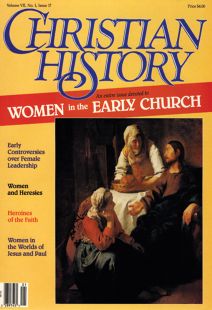From the Archives: Agnes: the Virgin Martyr
FROM THE BITTER PERSECUTION of Diocletian (303–305), a heroine emerged. Agnes embodied the two ultimate devotions of Christianity: virginity and martyrdom. Since church fathers often spoke in glowing, almost worshipful, terms of both virgins and martyrs, it was natural that they would hail this young girl, martyred in about 304 A.D. The early-5th-century poet Prudentius takes up the story:
So brave a girl, a martyr famed
Was Agnes, who in Romulus’ home
Lies buried in a tomb. She sees
In death Rome’s towering roofs
And so she keeps her people safe.
She also shields the pilgrims there
Who pray with pure and faithful hearts.
A double crown of martyrdom
Sets this noted girl apart:
Virginity free from any fault,
Then honor from a death she chose.
Hardly old enough to wed,
She was a little girl, they say,
By chance a child of tender years,
But aglow for Christ, with manly heart,
She defied the shameless laws.
For pagan idols she would not
Desert her holy, sacred faith.
First lured by many skillful tricks—
Now the lures of fawning judge,
Now the raging butcher’s threats—
She stood her ground tenaciously,
Of savage strength she freely gave
Her body to the harsh abuse;
She did not flee impending death . . . .
By Prudentius
[Christian History originally published this article in Christian History Issue #17 in 1988]
Next articles
Early Church Women and Heresy
Of course not only women were attracted to the heretical sects that diverged from early church orthodoxy, but women were prominent in their leadership and teachings. Why might this have been?
Ruth A. Tucker and Walter LiefeldPaula: A Portrait of 4th Century Piety
This close friend of the scholar Jerome, known for her scholarship and her extreme piety and generosity, was one of the most noteworthy people—women or men—in all the 4th-century church.
Nancy A. HardestyChristian History Timeline: Women and the Church Orders
Chronology of women in church orders.
the EditorsThe Chaining of the Church
Did unnecessary restrictions stifle the Spirit in the early church.
William David SpencerSupport us
Christian History Institute (CHI) is a non-profit Pennsylvania corporation founded in 1982. Your donations support the continuation of this ministry
Donate



